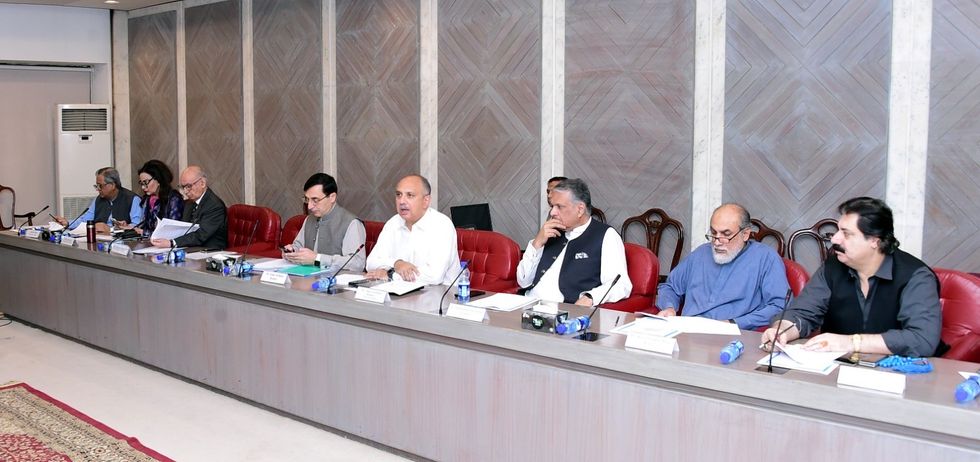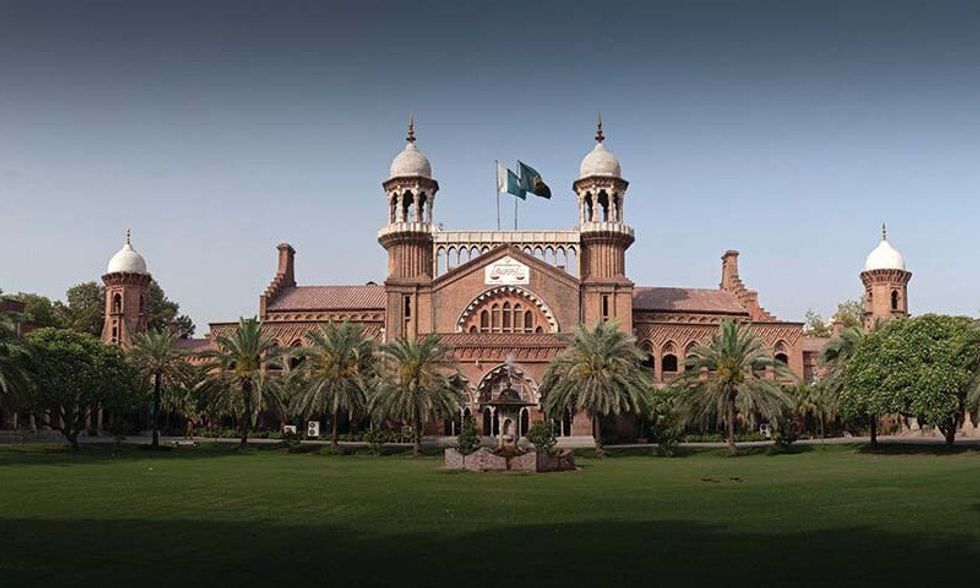Videos
Karachi’s darkest years: A decade after 9/11
More than 5,000 people were killed in these three years, with 2013 marking the bloodiest period
Sep 26, 2025
Sep 26, 2025
More than 5,000 people were killed in these three years, with 2013 marking the bloodiest period
The report reveals how viral falsehoods not only spread rapidly but also inflict real emotional and reputational damage
From Trump’s 'Drill Baby Drill' to Pakistan’s untapped oil reserves
But who started it and why was it suspended?
Seasoned crime reporter discusses the case, revealing flaws in the investigation
More than 20 villages in the region now make ice stupas every winter, benefiting over 16,000 residents
Punjab pushes for agricultural growth, Sindh warns of worsening water shortages. Can this project move forward without deepening interprovincial tensions?
The Citizens Foundation (TCF) is breaking barriers with education
Fifty years ago, the magician was in the form of his life and gave Pakistan it’s first British Open title in 12 years
Mustafa Amir was kidnapped and allegedly murdered by his friends in Karachi’s DHA on January 6
The group planned and executed targeted killings, including of police officers and an assassination attempt on MQM leader Khawaja Izhar ul Hasan
Despite record legislation, rushed bills and political turmoil marked the National Assembly’s first year
There are a thousand different reasons why the beautiful game paints a bleak picture in a sports-mad country. But primarily it’s power struggles, poor management and allegations of corruption within the national set-up which have caused the greatest harm.
Pakistan’s parliament is all set to amend 26 important articles of the constitution, which will change the basic structure of the judiciary.
These have been approved by a special parliamentary committee headed by senior Pakistan People's Party (PPP) leader Syed Khursheed Ahmed Shah. Mr. Shah announced on Friday that a consensus has been achieved and the committee has unanimously approved the draft constitutional package.
However, the proposals of coalition parties were not included in the draft. Meanwhile, the Awami National Party (ANP) boycotted the meeting, and the Pakistan Tehreek-e-Insaf (PTI) and Jamiat Ulema-e-Islam Fazl (JUIF) opposed the draft.
A source involved in the meetings told Nukta that military trials for civilians attacking significant military installations, military property within cantonment areas, and harassing military personnel at check-posts included in an earlier draft were taken out. These could have had a bearing on cases related to the May 9, 2023 riots, which also involve the founder of the PTI, Imran Khan.
According to the draft approved by the special committee on Friday, judicial appointment processes, the powers of the Supreme Court and high courts will change.
The appointment of the Chief Justice of Pakistan will be for three years and the appointment will be made by a three-member panel instead of on the basis of seniority. The chief justice's appointment will be made by a 12-member parliamentary committee which will nominate one of three senior-most judges.
The committee will then send the name of the nominee to the prime minister, while the president will ratify the nominee.
The special parliamentary committee will consist of 12 members, eight from the National Assembly, or the lower house, and four from Senate, or the upper house.
Each parliamentary party will be represented in proportion to their strength in parliament, nominated by their respective parliamentary leaders.
The nominees for the new chief justice will be sent to the prime minister 14 days before the chief justice retires after a majority vote by the special committee.
However, after the amendments are passed, the first nomination will be sent three days prior to the chief justice's retirement.
According to the draft, a constitutional bench will be formed in the Supreme Court, which will be appointed by the Judicial Commission of Pakistan.
The constitutional bench will comprise an equal number of judges from all the provinces.
All-important powers which the Supreme Court exercises under articles 184, 185 and 186 will be shifted to the constitutional bench.
Instead of the Supreme Court, the constitutional bench will hear all direct petitions filed under articles 184 (3), which are cases of public importance or involve a violation of fundamental rights.
The constitutional bench will also take on the Supreme Court's appellate jurisdiction for a criminal or constitutional judgement or sentence passed by a high court.
The new bench will also take on the advisory jurisdiction of the Supreme Court, when the president can seek the opinion of the apex court on questions of public importance.
All such petitions, appeals and review applications already pending in the Supreme Court will be immediately transferred to the constitutional bench.
It has also been proposed to empower the Supreme Court by amending article 186A of the constitution to transfer any case from the high court to the Supreme Court.

Article 184 will be amended, according to which, the chief justice's powers to take up cases will be abolished. Important powers and cases will be shifted to the constitutional bench from the Supreme Court.
Article 179 of the amendment proposes that the tenure of the chief justice will be for three years, if his or her appointment is at the age of 60. Otherwise, the retirement age of the chief justice will remain at the age of 65.
In the proposed constitutional amendment, the chief election commissioner will be able to continue working after the expiry of his or her tenure until the appointment of a new commissioner.
After approval of these amendments, cantonment boards will be allowed to impose local taxes, fees, charges, and tolls in cantonment areas.
Before these amendments, the chief justice of the Islamabad High Court and the senior-most judge of the high court jointly proposed the name for appointment of judges in the Islamabad High Court.
After this amendment, a senior lawyer with 15 years of experience and a federal minister will also be included in the nominating panel. The lawyer and federal minister will be nominated by the prime minister.
The government and its allies have also proposed an amendment to Article 175A, under which the judicial commission will now review the performance of high court judges annually.

In the 26th Amendment, the powers of the high courts have been curtailed by amending article 199 of the constitution, suggesting that high court cannot pass an order other than prayer in the petition.
“For removal of doubt, the High Court shall not make an order or give direction to make a declaration on its own or in the nature of suo moto exercise of jurisdiction beyond the contents of any application,” says the draft.
With these amendments one point is clear, Chief Justice Qazi Faez Isa is going to retire on 25th of October 2024.
The amendments do not change the retirement age of supreme court judges, which according to article 179, is 65.
After the incumbent chief justice, the three senior-most judges are Justice Mansoor Ali Shah, Justice Muneeb Akhtar and Justice Yahya Afridi.
If these amendments are approved from parliament, then anyone from among these three will become the new Chief Justice of Pakistan.
With additional input by Amber Rahim Shamsi
Things have gone south for the country’s cricket in recent times but all is not lost. With a few right steps, they can fall into place
The Lahore-born Usman Khan made history by qualifying for the Olympics twice. But fate handed him a raw deal and kept him from representing Pakistan both at Tokyo 2020 and Paris 2024. However, it couldn’t break the resolute rider, who has now set his sights on achieving glory at LA 2028.
The deadlock stems from the Supreme Court’s July 12 ruling, which declared Pakistan Tehreek-e-Insaf (PTI) entitled to seats reserved for women and minorities
Barrister Ali Gohar declared the protest over, instructing workers to return home immediately
The other Asian teams have shown resilience and determination — qualities that Pakistan currently lack
Pakistan team selection ahead of the forthcoming home series reflects a blend of experience and desperation
